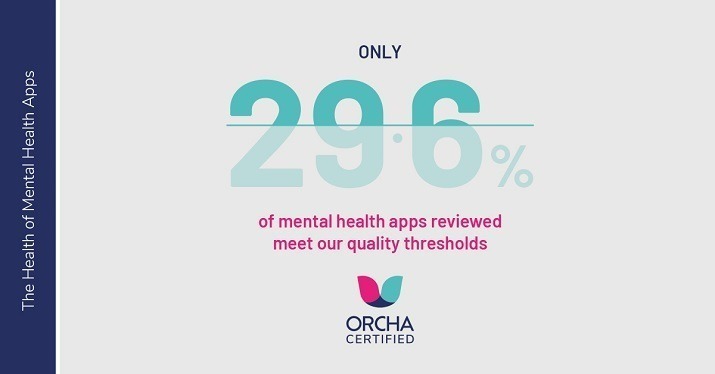The landscape of digital mental health apps: huge unmet needs, quality concerns, app stores asked to ensure transparency
 Addressing the mental health crisis (Pharma Field):
Addressing the mental health crisis (Pharma Field):
Each day we find out more about the mental health effects of the pandemic. Early on, the Office for National Statistics found that one in five Britons reported symptoms of depression, compared with one in 10 before. And, according to a recent study led by the University of Nottingham and King’s College London, stress, anxiety and depression were all significantly higher in participants compared with ‘population norms’, with 64% of the participants reporting symptoms of depression and 57% reporting symptoms of anxiety.
… Through simple force of necessity, COVID-19 has prompted many people to explore the benefits of telehealth and digital therapeutics, from the comfort of their home. In fact, it’s estimated that the number of people using digital therapeutics and wellness apps will grow from 627 million in 2020 to more than 1.4 billion in 2025. I believe that clinicians and the public have realised that digital solutions can deliver high-quality healthcare, with lower barriers to access, and significant benefits in cost and time effectiveness.
But there is progress to be made. Digital mental health solutions, and the companies that provide them, must overcome some important hurdles to ensure better user experience. At present, very few mental health apps have study data. It’s critical that these are grounded in science, with activities being evidence-based. For example, we use the principles of cognitive behavioural therapy (CBT), mindfulness and positive psychology – all based on in-depth research. In addition, ethical practices must be rigorous, with more being done to ensure companies store and utilise data ethically and responsibly. This needs to go beyond simply complying with GDPR; digital mental health companies need to develop and implement their own ethical frameworks and ideally have them externally audited.
What is the Health of Mental Health Apps? (ORCHA):
The Organisation for the Review of Care and Health Apps (ORCHA) has reviewed almost 600 mental health apps that help people experiencing anxiety, depression, self-harm, panic attacks, and thinking of suicide. Each app was assessed against more than 260 criteria across Clinical Assurance, Data Privacy, and User Experience.
Of these apps, only 29.6% meet quality thresholds; a figure that drops even lower for certain conditions, including:
-
- 27% for Addiction
- 26% for Suicide Prevention
- 23% for Insomnia
- 18% for eating disorders.
- 9% for Bipolar
- 5% for apps for OCD
Why Reviewing Apps Is Not Enough: Transparency for Trust (T4T) Principles of Responsible Health App Marketplaces (Journal of Medical Internet Research)
- Abstract: The overselling of health apps that may provide little benefit and even harm needs the health community’s immediate attention. With little formal regulation, a light-touch approach to consumer protection is now warranted to give customers a modicum of information to help them choose from the vast array of so-called health apps. We suggest 4 guiding principles that should be adopted to provide the consumer with information that can guide their choice at the point of download. We call these the Transparency for Trust (T4T) principles, which are derived from experimental studies, systematic reviews, and reports of patient concerns. The T4T principles are (1) privacy and data security, (2) development characteristics, (3) feasibility data, and (4) benefits. All our questions are in a simple form so that all consumers can understand them. We suggest that app stores should take responsibility for providing this information and store it with any app marketed as a health app. Even the absence of information would provide consumers with some understanding and fuel their choice. This would also provide some commercial impetus for app developers to consider this requested information from the outset.
News in Context:
- The National Academy of Medicine (NAM) shares discussion paper to help empower 8 billion minds via the ethical adoption of digital mental health and neurotech
- Ten neurotechnologies about to transform brain enhancement & health
- Startup Big Health raises $39M to universalize access to cognitive behavioral therapy (CBT) for anxiety and poor sleep


